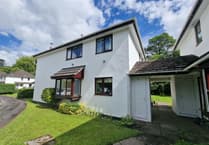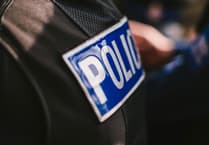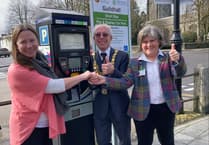As a first year mental health nursing student at the University of Gloucestershire, an opportunity arose for me to volunteer in Ghana — of course I had to take it!
My six-week trip was organised by a company called Work The World – who I can’t thank enough for giving me the experience of a lifetime. I did placements in psychiatric units at two different hospitals and at a vocational school for children with learning disabilities. I also visited a school for the deaf and did community outreach work carrying out mental health check ups out in the villages.
It was a real eye-opener. Everybody here complains about the NHS here and I know it is not as good as it could be but compared to what they have in Ghana, it is state of the art. Seeing what they have made me feel so grateful and so lucky to have what we have.
The trip was unforgettable above all for the people I met. On a visit the ghetto in New Takoradi with vaccinators and a nurse, everyone I met was lovely and welcoming and all the men were flirty asking if they could marry me for a visa! I was shown how they catch and smoke fish, the awful conditions in which they live and heard about their corrupt government.
I also worked in the wound clinic where I helped to treat conditions such as Lymphatic filariasis (commonly known as elephantiasis). The patients have to pay for all the equipment they need such as iodine and bandages, as well as the service provided. Waiting times are long and pain management does not seem to exist.
Another eye-opener was my placement at a Catholic vocational school for those with learning disabilities — primarily autism and cerebral palsy. In the culture here, they take people with learning disabilities and mental/ physical ill health to prayer camps before seeking treatment as they believe the individual is possessed and praying can cure them.
I volunteered in a school for the deaf where the students are all ages. They understand English well, so they taught me how to sign in Fante – the main language in Ghana. I also attended a gospel church where prayers were said for those in pain who could not afford healthcare. The Ghanaian children were lovely and would all shout Oborɔnyi to me – meaning white person. Less welcome were the mosquitoes – I came home riddled with bites. Then there was the food, a huge adventure. I tried Ghanaian foods like fufu and waakye which is highly recommended by the locals, and the staff at the two hospitals I worked at enjoyed bringing Ghanaian food to work for me to try.
The bar two doors down from where I stayed sold a local spirit (unnamed and 80 per cent strength) which tasted a bit like absinthe or tequila and was extremely potent. On Thursdays we had a barbecue night where we learnt a Ghanaian dance and how to play African drums.
On placement in a psychiatric unit at a hospital, I attempted to speak Fante with the patients for their medication reviews. I also helped with put data together to formulate mental health promotion in schools, the community and prayer camps.
I has been interesting to learn how ‘mental retardation’ is still part of the language used in psychiatry when looking through patients’ paper records and electronic medical records (EMR). These records are very vague and multiple patients have the exact same summary of care which is not personalised and does not give enough information on their condition and progression.
I bonded well with the staff, so much that even the head of the psychiatry unit said if she had had a child, she would have wanted a child like me — this comment absolutely made my day. I
went out with the community mental health outreach team to a small town to check in on patients and see how they were managing with their medication.
During my visit, a lady approached me speaking in Fante. I did not know what she was saying, then all of a sudden, she started shouting at me, becoming aggressive. The mental health nurse I was with had to step in front of me and he told me to walk away. All the commotion was because I was white and not giving her money. This theme has cropped up on numerous occasions throughout my time in Ghana, when I was verbally and on one occasion almost physically attacked.
I also worked at the Kwesimintism District Hospital in the psychiatry unit. There was not a substantial difference noticeable between the care or treatment of patients at the other hospital I worked at, apart from the district hospital having connections to mental health supported living accommodation and prayer camps. I went to an orphanage set up by one incredible woman who looks after 13 orphans by herself, ranging in two to school leaver age.
She works to give them a good life with the little resources they have. She has to pay for everything for their schooling and medical treatment as well as look after herself. Currently, the orphanage is saving up for a van to transport the children to school, which is proving difficult since donations are limited and have been decreasing since Covid-19.
I played football with young men living at the orphanage who are the most optimistic people I have ever met especially given their circumstances. To experience their bond and brotherhood was so beautiful. I asked uncomfortable questions to learn more about their lives which they seemed more than happy to share. They spoke about what happened to them, their family, how the orphanage has changed their lives for the better and their future ambitions they could now work towards thanks to the orphanage taking them in. I was moved almost to tears hearing their stories. The time I spent with those young lads will stay with me forever. The next morning, I had to take the day off grom my nursing placement as I could not sleep with all the emotions drowning me. This whole experience has sparked my idea to create a Go Fund Me appeal for the orphanage. I am still working on it now but watch this space. All money given or items donated will go straight to the children, paying the bills and for food, clean water, clothes and shoes and hopefully there will be enough for a van!
During my placements at the hospitals and clinics, I saw some tough things.It was difficult seeing patients being diagnosed with the wrong condition and given medication I would not recommend. For example, someone came in reading off Google symptoms of bipolar disorder saying how they feel tearful yet does not experience manic episodes.
Further investigation revealed they were grieving the loss of their sister and had no support in overcoming this. The patient was diagnosed with bipolar disorder and given a typical antipsychotic (haloperidol) yet the real issue was grief.
I alsos had the chance to visit a supportive living home which takes in those who have mental ill health and, without family, had been living on the streets. Nurses come once a day to give medications and injections, all purely run off of donations once again.
I also saw my first surgical operation during my trip, another amazing experience! I was asked if I would like to see an abdominal hysterectomy due to fibroids in a local private hospital.
This was amazing to see and to be able to talk to the surgeons during the surgery asking questions. I will not lie – I almost fainted from the smell of burning flesh and tissue. Gross. But the rest was so cool!
My last and sixth week in Ghana saw me staying in a family’s home in Akwidaa town. This is a town founded in 1402 by the sea with a population of approximately 7,000 people — I believe there to be more goats than people!
The trip to the town took two hours from Takoradi where we swerved across roads avoiding potholes and even got stuck going up a rocky hill! It was worth it though as the family and their friends weren so welcoming and friendly that I did not want to leave! We were cooked amazing food such as yam, fish, spaghetti, omelettes, plantain, oats, jollof rice, flying fish, cassava, gobe… the list goes on.
It was difficult adjusting to the native language of Ahanti after been speaking Fante in Takoradi to patients; people also speak Twi and Gaa. They are similar so I was still understood when I spoke Fante but there were occasions when the message didn’t quite get through as planned! It was extremely humid in my bedroom without air conditioning but because I did so much during the day I fell asleep the moment my head hit the pillow every night.
Far from missing 24/7 communication, it was refreshing having no WiFi or phone signal during my time in Ghana and not having any contact with the outside world. It was also amazing and felt extremely freeing showering outside in the dark only lit up by the moonlight. I had to get used to drinking water out of a bag as that is the only safe drinking water.
My trip saw me expereience rollercoaster of emotions where I have struggled with my own mental health after being affected by heart-wrenching sights but also had the most incredible moments of my life. I have been blessed to have clear starry nights, friendly hosts and tasty food! And the children were incredibly friendly, I taught a dance to the local children which they then shared with everyone in the community. All in all, it was an experience I wouldn’t have missed for the world.




